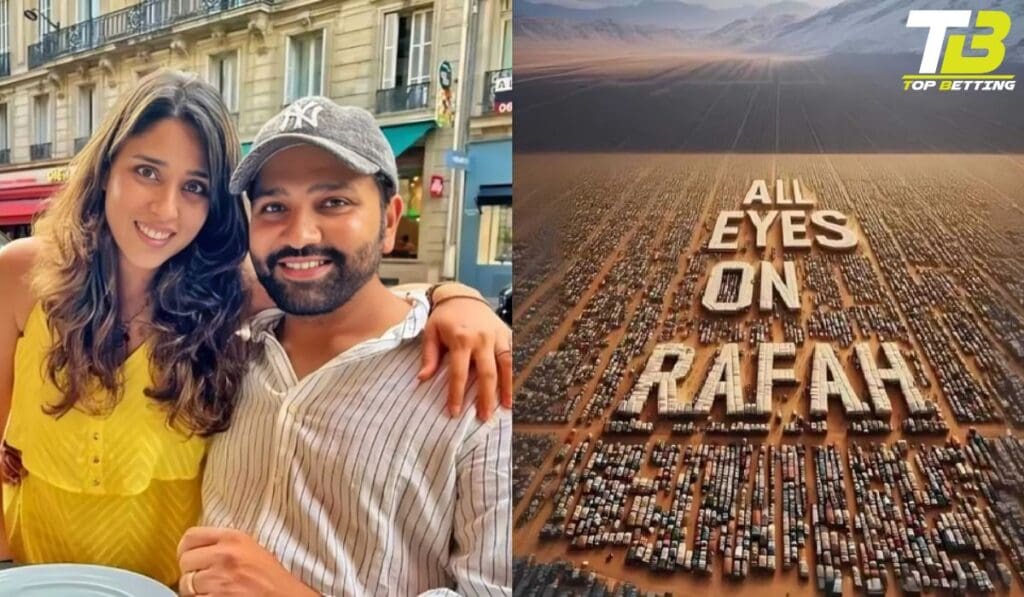
Ritika Sajdeh Deletes All Eyes On Rafah Post After Trolled
As the cricketing world eagerly awaits the upcoming T20 World Cup, the spotlight has unexpectedly shifted to Rohit Sharma‘s wife, Ritika Sajdeh. Ritika’s recent Instagram post expressing solidarity with the people of Rafah, Gaza has sparked a heated online debate, leading her to ultimately delete the controversial content.
Ritika Sajdeh’s ‘All Eyes on Rafah’ Post
In the wake of the ongoing conflict in the Middle East, many public figures, including several prominent Bollywood celebrities, have taken to social media to voice their support for the people of Palestine. Ritika Sajdeh, the wife of Indian cricket captain Rohit Sharma, joined this growing chorus by sharing an “All Eyes on Rafah” Instagram story.
The Backlash and Ritika’s Response
However, Ritika’s gesture of support did not sit well with a section of social media users. The post quickly went viral, particularly on the microblogging platform X (formerly known as Twitter), where she faced a barrage of criticism and trolling.
Some accused Ritika of being selective in her social activism, questioning why she had not spoken out on issues within India. Others joked that she might not even be aware of the location of Rafah, implying a lack of understanding of the geopolitical situation.
Faced with the intense online backlash, Ritika ultimately decided to delete the “All Eyes on Rafah” Instagram story, a move that further fueled the controversy. Many interpreted her decision as a retreat from her initial stance, while others argued that she should have stood her ground and continued to voice her support for the Palestinian cause.
Celebrities and the Palestine-Israel Conflict
Ritika Sajdeh’s case is not an isolated incident. Several high-profile Bollywood celebrities have also faced similar scrutiny for their stance on the ongoing conflict between Israel and Palestine.
Actors such as Kareena Kapoor, Alia Bhatt, Varun Dhawan, Triptii Dimri, Samantha Prabhu, Fatima Sana Shaikh, Swara Bhasker, and Dia Mirza have all expressed their solidarity with the people of Palestine on social media. However, their posts have also been met with a mix of support and criticism from their followers.
The polarized nature of the debate surrounding the Palestine-Israel conflict has made it increasingly challenging for public figures to navigate the delicate issue without facing backlash from one side or the other.
The Role of Social Media in Amplifying Narratives
The Ritika Sajdeh incident highlights the significant role that social media platforms play in shaping and amplifying narratives surrounding complex geopolitical issues. In today’s digital landscape, public figures are increasingly expected to take a stand on various social and political matters, often facing intense scrutiny and backlash for their perceived positions.
The Broader Implications: Navigating Activism and Diplomacy
The Ritika Sajdeh saga raises broader questions about the intersection of celebrity, activism, and diplomacy. As public figures increasingly use their platforms to voice support for various causes, they must carefully consider the potential consequences and the impact of their actions on international relations.
The diplomatic fallout between Israel and Spain, triggered by the recognition of a Palestinian state and the “All Eyes on Rafah” sentiment, highlights the delicate balance that must be struck between supporting humanitarian causes and maintaining constructive diplomatic ties.
Lessons Learned and the Way Forward
The Ritika Sajdeh controversy serves as a valuable lesson for public figures, social media users, and the broader public on the importance of responsible and informed engagement with sensitive global issues.
Firstly, it highlights the need for greater awareness and understanding of the underlying complexities of conflicts like the one in the Middle East. Simplistic narratives or selective outrage often fail to capture the nuances of these situations, leading to polarized and counterproductive dialogues.
Secondly, the incident emphasizes the importance of considering the potential diplomatic and geopolitical consequences of one’s actions, especially when it comes to high-profile individuals with large followings. Thoughtful and measured responses, grounded in empathy and a commitment to constructive dialogue, are crucial in navigating these delicate matters.
Conclusion
The Ritika Sajdeh controversy has shed light on the intricate relationship between public figures, social media, and the delicate dynamics of global conflicts. While the initial gesture of solidarity with the people of Rafah was well-intentioned, the backlash and subsequent deletion of the post have raised important questions about the role of celebrity activism and the challenges of navigating sensitive political issues in the digital age.

As the world continues to witness the unfolding of the Palestine-Israel conflict, the Ritika Sajdeh incident serves as a poignant reminder of the need for a more thoughtful, empathetic, and responsible approach to addressing global issues. By fostering a climate of nuanced understanding and constructive dialogue, we can work towards finding sustainable solutions that prioritize human rights and diplomatic cooperation.











